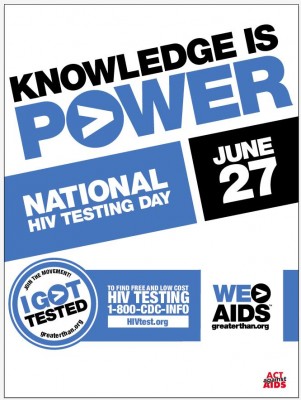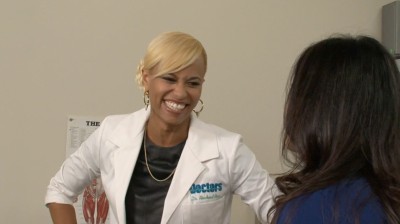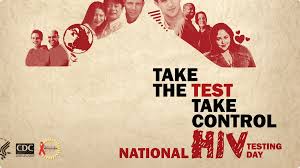June 27 is the 19th National HIV Testing Day, an annual campaign by the CDC to encourage people to “Take the test and take control”. Nearly 1 .1 million people in the US have HIV, yet only 1 in 5 people know they are infected.
The brilliant Dr. Rachael Ross is a family physician, author, sexologist, and co-host of the nationally syndicated TV show “The Doctors”. She joins Eclipse Magazine to discuss OraQuick, the first in-home rapid HIV test, and to spread the word about HIV testing and knowing one’s HIV status.
Dr. Rachael Ross is a recurring co-host on the Emmy Award-winning talk show “The Doctors”. She is a practicing board-certified family medicine physician. She is also a sexologist who has pioneered groundbreaking discussions about relationships, sex, abstinence HIV/AIDS prevention and comprehensive sex education for teenagers.
Dr. Rachael earned her M.D. from Meharry Medical College where she graduated with her sister Dr. Rebekkah Ross, her B.A. from Vanderbilt University where she studied anthropology, and her Ph.D. from the American Academy of Clinical Sexologists. She currently lives in Chicago, IL and commutes to her hometown of Gary, Indiana, where she practices family medicine alongside her father, Dr. David Ross, and her brother, Dr. Nathaniel Ross. Her mom Ruthie serves as office manager. Dr. Rachael’s sister, Rebekkah Ross, was also a physician and part of the Ross Family Doctors’ practice until she passed away from complications related to sickle cell anemia in 2011.
In 2012, Dr. Rachael received the prestigious Athena International Service Award for her philanthropic work in mentoring girls that she and her sister Dr. Rebekkah started in 2004. She continues to lecture throughout the U.S. passionately offering “prescriptions for life”.

I’m excited to speak with a fellow medical colleague about this topic!
I agree!
![]()
![]() We are going to talk about National HIV Testing Day, std testing clinics south orange county and a new product that came out to make HIV testing easier. Before we do, please share a little background about yourself.
We are going to talk about National HIV Testing Day, std testing clinics south orange county and a new product that came out to make HIV testing easier. Before we do, please share a little background about yourself.
I am a board certified family physician practicing medicine in Gary, Indiana. I live in Chicago, Illinois. People can watch me pretty much catch me any day of the week on “The Doctors”.
I love that show! It has a lot of facts with information in an easy to understand, patient friendly manner. It’s a great show to refer patients to.
That’s great!
How did you get involved with HIV National Testing Day?
It came about organically. HIV has always been one of my main things I’ve been fighting ever since college. I’ve always been an HIV prevention advocate, and always advocating for testing, which pushed me into the field of sexology. When Oraquick contacted me about working together to get the word out about this new technology that’s available to test at home, and to speak about HIV testing, prevention, and HIV in general , it was a no-brainer. A symbiotic relationship.
I’m sure you see a lot of people who are unaware of how important it is to be tested for HIV.
Yes, I see a lot of patients. I see a lot of friends. And I see a lot of family, friends, all who are not aware of the importance of getting tested for HIV. Both the Center of Disease Control (CDC) and the US Preventative Task Force recommend that all people between the ages of 13 and 65 get tested at least once a year. That being said, I know that a lot of us are not really doing that, particularly when you think of the number of HIV cases where they don’t know they even have it. 20% of people who have it probably don’t even know they have it. The sooner you get on your meds, the longer your life expectancy. When you put all of that together, it just helps reinforce just how important the testing is.
There are a lot of people who really have no idea they have HIV, which is a risk. They have different partners and spreading the virus without realizing it.
Exactly.
People think technology has improved and the numbers should be getting better with the amount of people getting treated. Would you think that is the case from now vs. ten years ago?
It’s interesting, because in the last couple of years, there has been a slight decrease in number of newly diagnosed cases. Is that because more people are getting tested? There are a lot of factors that go into that. Now, HIV is concentrated in a variety of communities. In the African American community, a large majority of cases are women. When you look at who has HIV statistically in the country, African Americans only make up 11-12% of the population, but it makes 50-60% of the HIV cases. The statistics continue to stay around the same, around 500,000 newly infected HIV cases each year.
I don’t really see that anything is really changing. What has actually changed is technology. It is easier to test. We have better medication. We have neat things on the horizon like pre-exposure prophylaxis. There are potentially even some creams or gels can coat the vagina and decrease risk of contracting the virus.There are always stuff that is exciting on the horizon. For me, I would find the most pleasure in decreasing transmission and slowing it down to a screeching halt.
Would you say a large amount of people are still untested because of the stigma surrounding this?
People talk a lot about the stigma, but I really think it has to do with the fact that people think they aren’t going to catch it and if doesn’t have anything to do with them and if they have it, they don’t want to know. I’m not sure it’s stigma so much as one more thing to just ignore and act like we don’t have. I see the same kind of behavior with mammograms and pap smears. Some people would rather not know. Or they assume, “Nobody I know has breast cancer, so why do I have to get a mammogram?”
This is the same thing. With HIV, you can have this disease and be silent about it. You can go to your doctor, infectious disease specialist, get your medications, get your blood work, and not tell anybody. You can live for a very long time. New studies show people can live into their 60’s on HIV meds without any problems. What it has done is that the face of the disease has changed. African Americans and others remain quiet because nobody is “dying” in volumes like they used to. It is one of those things that has been brushed aside. More people than you know may have it and don’t know or taking their medications in silence. That plays more into it that anything. It is good old fashioned denial.
Would you say access to testing, cost, or coverage by insurance can be a factor?
Yes.
Whether or not someone has insurance, people have free access to testing, right?
Most health departments will test you for free. Obamacare is part of your covered services for prevention every year. Cost and access to care are important factors in this. I have a friend who goes to the gynecologist every year. She says she has never had an HIV test. That is not because she doesn’t have insurance. It is because her physician has never requested this test or talked to her about getting one. What is not happening is that providers are not reminding people to get tested. Nobody is talking about the fact that between 13-65, the new recommendation is that everybody gets tested once a year.
Access to care and education is a big part of it. Some people don’t even think they are at risk. They say, “I’ve only had three partners my whole life, so how am I at risk?” Risk is basically unprotected sex with anybody. They don’t even define it anymore as your spouse. We have plenty of patients who have become HIV infected from their partner, people they have been with for 10 – 15 years. Anybody with unprotected sex with another person puts you at risk.
Regarding access to education, people aren’t educated enough to realize they need one or should need one. People aren’t sure where to get tested. Now, if your schedule doesn’t permit you to take off and go to the doctor, you can run down to the 24 hour drugstore and get the same testing kit that any clinic that does rapid testing is probably already using in their facility. It’s just packaged differently. It’s a neat advance to witness.
So this new product Oraquick is similar to what they use in the clinic?
It really is the same test, but just packaged for consumer use. It has lots of directions and walks you through the steps. It comes with an 800 number if you run into troubles with the testing kit. If you are newly diagnosed and you think you might have HIV because the test is positive, you call the 800 number and they plug you into a local physician office where you get retested. Once you get a test that is positive, you actually supposed to retest to make sure that is in fact correct. Then get into care with someone who is a specialist in treating infectious diseases and HIV.
If they have a negative test, do you recommend they see their physician for further testing?
No. If you had any risky behaviors within the past 3 months or so, I would recommend retesting in 3 to 6 months. Make sure you are not engaged in any risky behavior, then go back to testing once a year. What you have to keep in mind with any rapid test, whether you are doing a rapid test at home or whether you are doing a rapid test in the clinic, is that unless otherwise specified, it takes 3-6 mo. of having the virus before it will show up on the test. For instance, if you contacted HIV 2 wks ago, 3 wks ago, 4 wks ago, it won’t show up on the test because the virus hasn’t done what it needs to do to show up and be active enough for the test to tell you that you have it. If you are worried about behavior you did 4 wks ago, then it is a smarter position to go to your doctor’s office and get a blood draw. They can do a more specific tests that can tell you sooner than the rapid tests will tell you.
For those who get Oraquick, it’s pretty simple.
Yes. You take it out of the package, you swab it along the gum line, place it in the developer solution, and wait 20 minutes. It’s the same exact way when you go to the Health Department and you want a rapid test. Oraquick Advanced is the one used in the clinic. Oraquick consumer grade is pretty much the same except sometimes in the clinic they may prick your finger or they may use saliva, but it is the same exact test.
Is it now currently available in stores?
Yes. In most retail drugstores, it retails anywhere between $49.99 on down. Each kit comes with one testing kit.If you have a partner or a friend you want to test with, everybody needs to buy their own individual kit. It is readily available. One of my favorite things, is that it is discreet. When you find out your diagnosis, you decide which doctor you want to go to for retesting. You have control of how things go after that moment. Another thing is convenience. It may be difficult for you or your new partner to take off and go to the health department or the clinic. This kind of simplifies things.
There are several different National HIV Days for the different populations – females, teens, African American. This shows HIV has no face. Would you agree?
I agree that HIV does not discriminate. I also have to say that your risk of contracting HIV goes up if you are having sex or attracted to a group that tends to have a high concentrations of HIV. So it doesn’t discriminate in terms of race, gender, nationalities, sexual orientation. You have to get it from somebody who has it. If you live in a community where HIV is prevalent, that definitely increases your risk of contracting the virus.
If people want to know more about this, are there resources online?
Absolutely. They can go to the CDC web site. If they want to know about Oraquick, there’s oraquick.com. drrachel.com has good information on HIV prevention. There are so many resources out there. I hope people care enough to learn more and to continue to get tested.
As mentioned earlier, people can go to your web site. If people want to learn more about this topic or other health issues, they can go to your site.
Absolutely.
Do you have any last take home points for our readers as far as National HIV Testing Day?
I would encourage people to use this as an opportunity to know their status, and that they talk to their partners, friends, loved ones about doing the same. Knowing is half the battle.
To stay updated on Dr. Rachael Ross and her “Prescriptions for Life”, you can go to the sites below:
Dr. Rachael Ross’s Official web site: www.drrachael.com
Twitter: @drrachael
The Doctors official web site: http://www.thedoctorstv.com/





